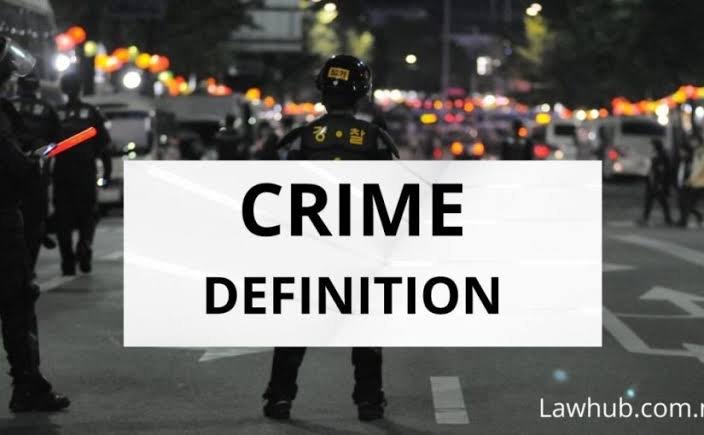N.B. This article is particular to Nigeria.
Crime
What is a crime? Can we get an all-encompassing definition for it? Continue reading.
The traditional debate over the definition or crime has not been grounded within the context if the more fundamental images of crime that actually guide the realms of criminological works. Prior to the present dispensation, scholarly attempts have been made by jurist in the quest of defining the term “crime”.
This effort has been like the pouring of water into the basket because unlike most germane legal concepts, the word crime is devoid of a universally accepted meaning. Thus, must be in line with the fact that the concept itself is a complex but elusive one which has therefore defiled every successful effort are ascertaining its exact meaning.
In the same vein, Justice Ayebe in his book “customary law: the war without arms” described the attempt to defines crime as “flirting with definition”. In fact, professor Glanville Williams has described the difficult task of attempting an accurate definition of a crime as “one of the thorny intellectual problems of the law”.
The debate over the definition of crime usually centers on the relative advantages and disadvantages of using “social” as opposed to a “legal definition” most criminologist have traditionally relied on the legal definition which defined it as a behavior in violation of the law.
However, there have been repeated attempts to move beyond this narrow confine, thus according to JWC turner, he posited that “the definition of crime has always been regarded as a matter of great difficulty”
The obvious reasons for this according to him is that
…the truth appears to be that no satisfactory definition has yet been achieved & that is indeed not possible to discover a legal definition of crime which can be of value for English law
The problematic nature surrounding the definition of crime under the English law has equal force under the Nigerian of crime. This cannot otherwise be so, in view of the colonial affiliation between the English common law and the Nigerian law. The Nigerian law of crime has therefore inherited intoto the concept of crime under the English law as well as its complex nature.
In order to do justice to this pertinent question, several dictionaries have likewise attempted to define the word “crime” thus, the Osborne dictionary defines it as: “an act default if conduct prejudicial to the community, the commission of which by law renders the person responsible liable to punishment by fine ii imprisonment in special proceedings..”
Similarly, the Oxford dictionary sees crime as “an act punishable by law as being forbidden by statute or injurious to the public welfare”.
The Black’s law dictionary went further to define crime as an “act or omission rendered punishable by the state”
Furthermore, the principal statutes regulating the Nigerian criminal law namely: the criminal code & the penal code offered no comprehensive definition to the meaning of a crime. Thus, section 2 of the criminal code, defines crime as “an act or omission which renders the person doing the act or making the custom liable to punishment under the code..”
Scholars & writers have argued that thus definition is indeed in that it is silent on the “elements of an offence” it omitted the “mental element” & that a good definition must accommodate both the “physical & mental element”
In the same vein, section 28 of the penal code simply provides ” except where otherwise appears from the context the word “offence” includes an offense under any law for the time being in force”.
Without doubt this definition is antiquated, failing to define the very term it sets to define.
Diverse views & concept have been laid down by scholars, thus, Earl Jowit defined crime as
“An act of default which tends to the prejudice of the community & is forbidden by law or pain of punishment at the instance of the state”.
Also, Sir James Stephen stated that “crime is an act forbidden by law & revolting to the moral sentiments of the society”
Nigerian jurists have also attempted, thus, Justice Karibi-Whyte in one of his writings stated that the only noticeable difference between the lay conception of crime & the lawyer’s conception of it is one between what the law ought to describe & what is actually designated namely “the ought & is” of law.
In the case of Liman v. State (2016) LPELR-40260 CA, the learned Justice Amina audi JCA stated that
“It is trite that criminal responsibility for the commission of crime is premised on the satisfactory proof of the two pillars if actus reus & mens rea.
In an attempt to define crime, Abiru JCA employed this view in the case of Njoku V. State (2017) LPELR 41250 CA.
From the foregoing, rather than travelling on a futile voyage of discovery at ascertaining the exact meaning and precise definition of crime, it is better to ascertain the scope and legal framework of crime.
To this end, the classical exposition of Lord Atkin in Proprietary Articles trade association V. A.G for canada becomes imperative. His lordship stated “The criminal quality if an act cannot be discerned by intuition nor can it be discovered by reference to any standard but one is the act prohibited by penal consequences”.
From the above, since no accurate definition can be offered, it may be safe to conclude that indeed, “Crime is what the state declares it to be”.
Contributed by: Abdulganiyu Ismail (AKA) Mastermind
Prepared and Written by: Ucheakonam Chijioke Joshua (CJ)


Leave a Reply